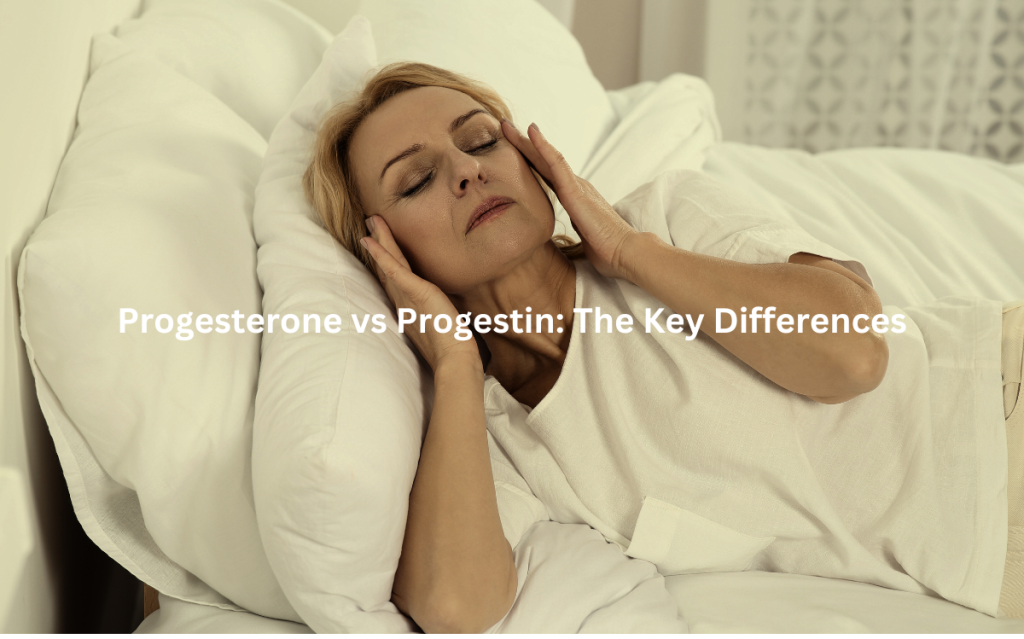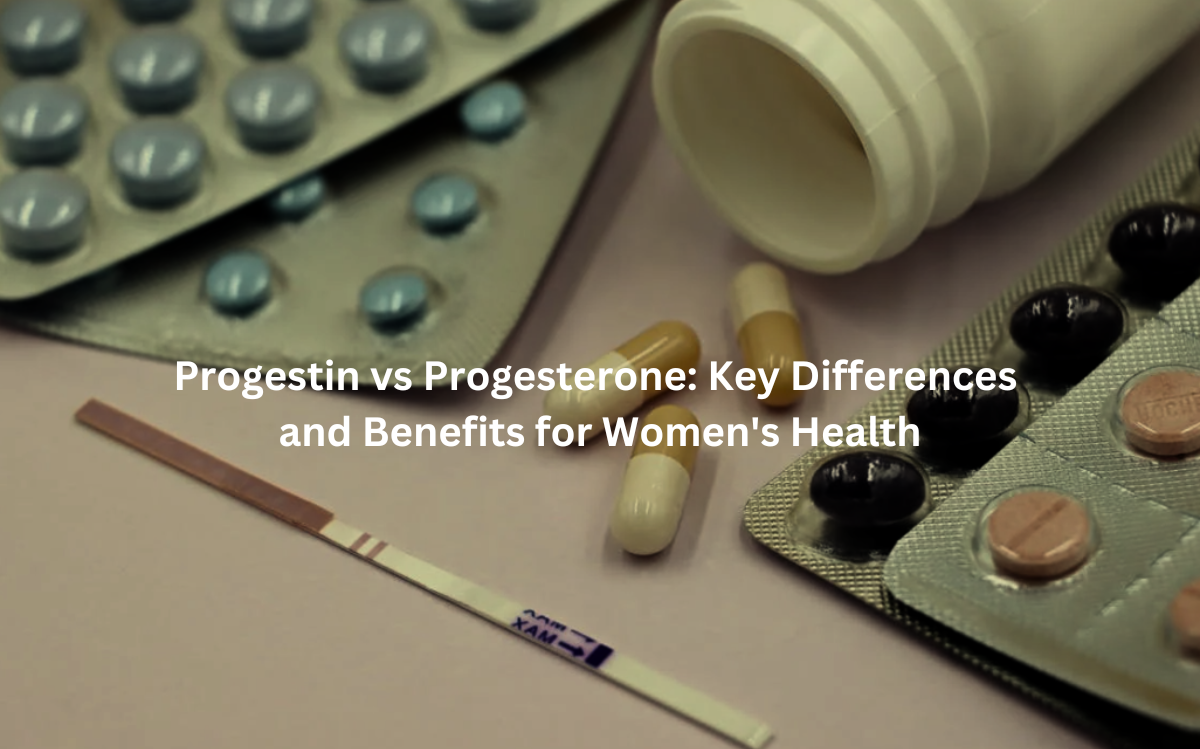Learn the crucial differences between progesterone and progestin and how they impact your health and treatments.
Progesterone and progestin are often confused, but understanding their differences is vital for managing hormonal health. (1)
While progesterone is a natural hormone, progestin is a synthetic alternative used in birth control and hormone therapies. Both have specific benefits and potential side effects, making it essential to know which one suits your health needs.
Key Takeaways
- Progesterone is natural, while progestin is synthetic and used in hormonal therapies like birth control.
- Progesterone helps balance the menstrual cycle, while progestin can have side effects like weight gain or mood changes.
- Knowing the differences between the two allows you to make informed decisions about hormone therapies and treatments.
What is Progesterone?
Progesterone is a naturally occurring hormone in the body, primarily involved in the regulation of the menstrual cycle and pregnancy. It is secreted by the ovaries and plays a vital role in maintaining the uterine lining during the luteal phase of the menstrual cycle.
Essentially, its main job is to “prepare” the body for pregnancy, ensuring that the endometrium (the lining of the uterus) remains thick enough to support a fertilized egg.
Why does this matter? If you’re looking to regulate your cycle or if you’re trying to conceive, progesterone is crucial. Women with low progesterone levels can experience irregular cycles or fertility issues. Its role doesn’t stop there—progesterone also supports other body functions, such as balancing estrogen’s effects and promoting a calming effect on the body.
Anecdotal tidbit: I remember a friend who struggled with fertility treatments. After switching from synthetic progestin to natural progesterone, she found her cycle regulated and finally got pregnant. It’s a small change, but it can make a big difference for some women.
What is Progestin?
Progestin, on the other hand, is the synthetic form of progesterone. It’s commonly used in hormonal contraceptives and in hormone replacement therapies (HRT).
Progestin is designed to mimic the effects of natural progesterone, but because it’s synthesized in labs, it doesn’t always act exactly like the natural hormone in the body. (2)
Why does this matter? Progestin is frequently used in birth control pills, IUDs, and certain HRT treatments to prevent pregnancy or to regulate menstrual cycles. However, some women experience side effects, such as weight gain, headaches, and mood swings, because progestin doesn’t always “fit” the body the same way progesterone does. If you’re experiencing side effects from your contraceptive or HRT, it might be because of progestin.
Personal experience: A colleague of mine had been on a progestin-based contraceptive for years but started noticing increased anxiety and weight gain. After a consultation, she switched to a different form of birth control with progesterone, and within months, she felt more balanced.
Progesterone vs Progestin: The Key Differences

- Chemical Structure
Progesterone is a naturally occurring hormone, while progestin is a synthetic substitute created in a lab. Despite having similar functions, they differ in chemical composition, which can result in different effects on the body. - Effects on the Body
Progesterone directly regulates the menstrual cycle and supports pregnancy. Progestin, though effective for preventing pregnancy and managing certain symptoms, may come with side effects like weight gain, acne, and mood swings. - Usage in Birth Control and Hormone Therapy
Progestin is more commonly found in birth control pills, IUDs, and combination hormone therapies, while progesterone is used in fertility treatments and some HRT regimens.
Benefits of Progesterone
- Regulation of Menstrual Cycles
Progesterone is the hormone that helps regulate the menstrual cycle. It signals the uterus to shed its lining when there’s no pregnancy, leading to a period. This makes it essential for women who experience irregular cycles. - Supports Pregnancy
For those trying to conceive, progesterone is key in creating a healthy environment for the embryo. It helps the uterine lining remain intact, which is crucial for early pregnancy. - Mental Health Benefits
Progesterone has a calming effect on the body and brain. For many women, it helps ease symptoms of anxiety and promotes better sleep during the luteal phase of the cycle.
Challenges of Progesterone
- Potential for Low Levels
Some women may experience low progesterone levels, leading to issues like irregular periods or difficulty getting pregnant. This is where supplementation becomes important. - Side Effects
Though rare, some women experience bloating, headaches, and mood swings when taking progesterone supplements, particularly if the dosage isn’t right.
Benefits of Progestin
- Effectiveness in Birth Control
Progestin is widely used in birth control pills, IUDs, and implants. It works by preventing ovulation, thickening the cervical mucus, and thinning the uterine lining, making it difficult for sperm to reach an egg. - Hormonal Therapy
Progestin is used in hormone replacement therapy (HRT) for women who have reached menopause. It helps balance estrogen levels and protect against uterine cancer in women with a uterus. - Variety of Forms
Progestin comes in many different forms: pills, IUDs, injections, and implants. This variety gives women a range of options to choose from based on their needs and preferences.
Challenges of Progestin
- Side Effects
Some women report side effects such as weight gain, acne, mood swings, and bloating with progestin. These effects may vary depending on the specific form of progestin used. - Synthetic Nature
Because progestin is synthetic, it might not always interact with the body the same way progesterone does. Some women find that progestin-based methods don’t suit them as well as natural progesterone.
Best Uses for Progesterone
- Fertility Treatments
Progesterone is often used in fertility treatments to help women conceive. It can be taken in the form of pills, injections, or even vaginal suppositories, depending on the treatment plan. - Hormone Replacement Therapy
For women going through menopause, progesterone can be part of hormone replacement therapy, especially if they still have a uterus. It helps prevent endometrial cancer, a risk that arises when taking estrogen alone.
Best Uses for Progestin
- Birth Control
Progestin is ideal for preventing pregnancy and is found in most hormonal birth control methods, such as pills, IUDs, and implants. - Endometrial Protection in HRT
Progestin is used in women who still have their uterus and are undergoing hormone replacement therapy. It helps protect the lining of the uterus from the unopposed effects of estrogen.
What Women Are Saying
Many women prefer progesterone-based therapies because of its natural origin. Women trying to conceive find it essential for creating a pregnancy-friendly environment in their body.
On the other hand, some women prefer progestin-based contraception because it provides long-term protection without the need for daily doses. That said, others experience frustrating side effects with progestin, making them more inclined to look for alternatives.
Conclusion: Practical Advice for Choosing Between Progesterone and Progestin
When deciding between progesterone and progestin, it really comes down to what you’re trying to achieve and how your body responds to each option.
If you’re working on fertility or are going through menopause, natural progesterone might be your best bet. But if you’re looking for birth control or are undergoing hormone replacement therapy, progestin is likely your go-to.
The most important thing is to talk to your doctor about your options. Every woman’s body is different, and what works for one person might not work for another. Your healthcare provider will help you understand which option is best suited for your health and lifestyle.
Need guidance on which option is right for you? Book a consultation with Modern Menopause today and get expert support for your health needs. Book your appointment now.
FAQ
How do progestin and progesterone impact menopause symptoms like hot flashes and night sweats?
Both progestin and progesterone can help manage menopause symptoms such as hot flashes and night sweats. While progesterone is a natural hormone, progestin is a synthetic alternative often used in hormone therapy (HRT).
These hormones can help regulate hormone levels, providing relief for vasomotor symptoms. Women with irregular periods or high blood pressure may benefit from different types of progestin or progesterone, depending on their health conditions.
Can progestin and progesterone affect blood clots and heart disease risks?
Yes, both progestin and progesterone can influence the risk of blood clots and heart disease. Some studies suggest that synthetic progestins may increase the risk of blood clots, while natural progesterone is generally considered safer.
The risk of cardiovascular issues can be higher for women using oral contraceptives or systemic HRT, particularly those with a history of heart disease or high blood pressure.
What are the long-term effects of progestin and progesterone on bone health?
Long-term use of progestin and progesterone in hormone replacement therapy (HRT) can have mixed effects on bone health. Progesterone may help regulate bone density, while some synthetic progestins have been linked to bone loss.
Women using HRT should be monitored for bone health, especially if they have a history of osteoporosis or are at risk for it due to menopause-related hormone imbalances.
Is there an increased risk of breast cancer with progestin or progesterone?
The risk of breast cancer with progestin or progesterone is still debated. Some research shows a slight increase in risk, especially with prolonged use of combined HRT.
However, the benefits of using progestin for endometrial protection in women with a uterus are important to consider. The overall risk varies depending on the type of progestin used, dosage, and duration of treatment.
How do progestin and progesterone affect mental health during menopause?
Progestin and progesterone can impact mental health during menopause. Some women experience mood swings, depression, or anxiety when using synthetic progestins.
Natural progesterone may have a calming effect and help regulate mood. However, the hormonal changes during menopause, including shifts in sex hormones, can also contribute to mental health challenges, making it essential to work with a healthcare provider for personalized treatment.
What role do progestin and progesterone play in managing irregular menstrual bleeding during menopause?
Progestin and progesterone are commonly used to manage irregular menstrual bleeding during menopause. These hormones help regulate the reproductive system and stabilize the endometrial lining.
For women experiencing abnormal uterine bleeding or irregular periods, hormone therapy, including progestin or progesterone, can help restore more predictable cycles and reduce excessive menstrual bleeding.
Can progestin or progesterone impact vaginal dryness or discomfort?
Yes, both progestin and progesterone can influence vaginal health. While progesterone may help improve lubrication in some women, synthetic progestins are less likely to have this effect.
For women experiencing vaginal dryness or discomfort, other forms of hormone therapy, such as local estrogen or vaginal treatments, might be recommended in conjunction with progestin or progesterone therapy for comprehensive relief.
How do progestin and progesterone affect the risk of uterine cancer?
Progestin and progesterone can reduce the risk of uterine cancer in women who use estrogen therapy. When combined with estrogen, progestin helps protect the lining of the uterus, decreasing the risk of endometrial hyperplasia, which can lead to cancer.
However, the long-term use of estrogen without progestin can increase the risk of uterine cancer, particularly in women with a uterus.
Are there risks associated with using progestin and progesterone for birth control?
Using progestin or progesterone for birth control, such as in the mini pill or hormonal IUD, is generally safe but comes with some risks.
These include a potential increased risk of blood clots, especially with synthetic progestins. Women considering birth control methods like the mini pill or IUD should discuss their medical history, including risk factors for heart disease or blood pressure, to choose the most suitable method.
Can progestin or progesterone help manage menopause-related vaginal dryness?
Yes, progesterone can help manage vaginal dryness associated with menopause. While estrogen is the primary treatment for vaginal dryness, progestin may also help in combination with estrogen in hormone therapy, especially for women with a uterus.
Vaginal estrogen is often used directly to address dryness, but systemic hormone therapy may be considered for broader symptom relief.
References
- https://pmc.ncbi.nlm.nih.gov/articles/PMC4960754/
- https://www.mayoclinic.org/drugs-supplements/progestin-oral-route-parenteral-route-vaginal-route/description/drg-20069443

Leave a Reply